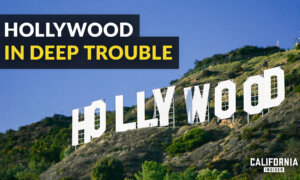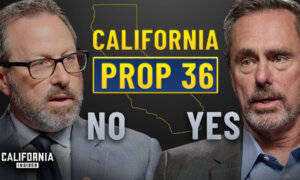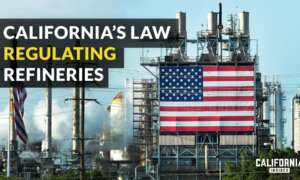Commentary
I recently wrote an article in which I revisited my first essay on the Motion Picture Production Code. It sparked an interesting assortment of responses in the comments, which were overwhelmingly positive. In fact, the majority of the commenters agreed with the article’s point that replacing the movie rating system with the Production Code is one of the only solutions for restoring some decency and tradition to American culture.
One comment struck me as particularly interesting. The user Umbrage Dudgeon III Jr. wrote:
“Meanwhile Epoch Times writers other than Miss Brannan continually tout R-rated movies, and the comments on most news stories and opinion pieces are a veritable textbook on profanity and obscene references.”
I’ve noticed both points he made and can confirm them to be true. This observation inspired me to write an article on this joint issue. This has nothing to do with the film review topics of other Epoch Times writers or the language of Epoch Times readers. It’s a general trend in the conservative movement, one which reveals a deep flaw in the ideology.
What Is Conservatism?
The names given to the rival political factions in the United States are often unclear, misleading, and inappropriate. The original meanings of Republican and Democratic are two similar forms of government, both of which are related to American politics. However, the concepts themselves have little to do with the beliefs held by either party. “Right-wing” and “left-wing” are vague categorizations, although one could reason that there’s a meaning behind being “in the right,” while the left side has long had negative connotations. Then, of course, there are the most popular terms for the social movements beyond these political parties: conservatism and liberalism. Everyone knows the deep political and social meanings these terms have. However, from a semantic standpoint, the words chosen to define the two major American belief systems are inaccurate.
Historically, the word “conservative” has meant cautious, marked by moderation, and even frugal, coming from the Latin word “conservare” which means “to preserve.” Obviously, it’s related to the English verb “conserve.” The word “liberal,” in a non-political sense, means generous, ample, permitting liberty, and giving unsparingly; it comes from the Latin word “liberalis,” meaning “befitting a freeman,” which is a variation of “liber,” the Latin word for “free.” It’s clear that it is related to the noun “liberty” and the verb “liberate.”
These standard definitions aren’t exactly accurate descriptions of the groups they define. Fiscally, Republicans tend to favor caution in spending, whereas Democrats are far more likely to spend unsparingly. But there are many topics on which the right is much less restrictive than the left, such as gun control, free speech, and other such legislative topics. I think one can be a conservative in three different areas: politically, socially, and morally.
Profanity
Many people who claim to be conservative don’t hold to traditional moral standards. Perhaps the most blatant example of this relates to profanity, blasphemy, and vulgarity in speech. Whether on social media tirades, angry comments on articles, or even merchandise for or against a candidate, political matters tend to bring out the foulest language. Sadly, this is a non-partisan issue, since the right shows no more purity in language than the left. “Alt-right” conservatives will use the most vulgar swear words imaginable while denouncing the moral depravity of liberal elites. Wouldn’t the point be stronger if it were made with powerful but pure language?
The usage of the worst words in the book has become so common and comfortable for most people, it’s absolutely shocking. Thinking of my friends, colleagues, and acquaintances from different walks of life, it’s much harder to think of those I haven’t heard frequently swearing than those who curse all the time. All rules about improper language for mixed company or in front of ladies have gone out the window. In fact, many young women swear as much as if not more than young men!
I blame the normalization of profanity on its pervasive presence in movies, television, and other entertainment. Whether he acknowledges it or not, the average person is greatly influenced by that which he partakes. It could be going to the movie theater for an evening out, tuning into a talk show on the car radio, scrolling through Facebook, streaming hours of movies and shows on Netflix, or listening to a podcast every morning. All these popular diversions tend to be replete with bad words and vulgarisms, and they all take their cues from Hollywood. Since the film industry abandoned its standards of rampant profanity in replacing the powerful Motion Picture Production Code with the current ineffective rating system in 1968, movies have made the vulgarest language imaginable very common. By hearing these words over and over, people have grown so accustomed to them that they no longer feel any qualms about saying (or at least typing) them.
The Rating Factor
When anyone asserts the Code’s superiority, someone is bound to say that ratings are the better system because they give people a choice. If you don’t like films with a certain kind of content, don’t watch them! After all, the rating descriptors warn about the elements which earned each PG, PG-13, and R. In many comment sections on Epoch articles about films, you’ll see people say things like “that’s why I don’t support Hollywood anymore” or “I haven’t watched new releases since the 1990s.” Very few people say, “I only watch G-rated films” or “I’ll watch current releases, but not ones which are rated PG-13 or R.” (I’m not talking about parents who are choosing their children’s entertainment but adults just deciding for their own viewing.)
Realistically, how many mainstream films would be left if you avoided any recent release which was rated PG-13 or R? Even movies aimed at younger viewers, like “Star Wars” films and superhero movies, are usually rated PG-13. The few films rated G or even PG are almost exclusively children’s movies and usually pretty mindless, immature stuff. Hollywood thinks that “mature” is a synonym for dirty or obscene. Thus, unless you’re willing to avoid basically all modern movies, you’re going to expose yourself to at least foul language in the guise of entertainment, and often a lot of other bad things, too.
The conservative movement will always have a fatal flaw as long as it condones the same worldly vices as liberals. We need to embrace the traditional values which made our country strong, and that includes a high moral standard of personal conduct, entertainment, regard for others, and speech.














